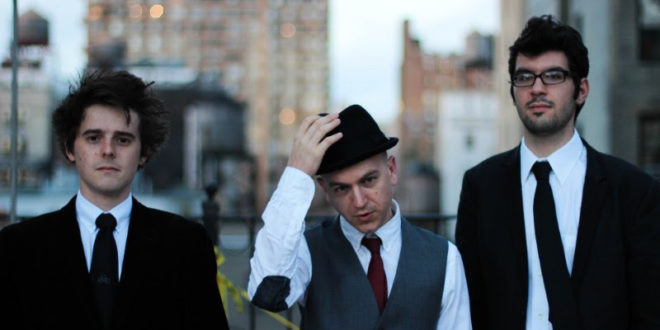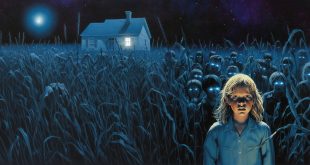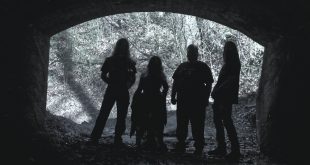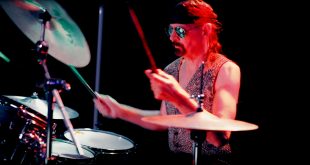Late Sea is a burgeoning art rock trio based in Manhattan, New York. Much like the city itself, the band is also a multicultural entity. Singer-guitarist/pianist Izzy Gliksberg hails from Israel, synthesist/trumpeter Sam Nester from Australia, and drummer Joe Peri from the USA. Nearly two years ago, the band conceptualized an ambitious release known as The Writer’s Trilogy. This audio/visual EP comprises three tribute tracks to three iconic mid-20th-century novelists, Paul Celan, Gabriel Marcela Marquez and Franz Kafka. Those three tracks then become the subject of a longer piece, tying them all together. The initial single from the EP, “The Great White,” about Celan, debuted via Impose Magazine in September. A release date for its accompanying music video is slated for November 14.
I had the pleasure of speaking with Izzy, the project’s primary visionary, and catalyst. We discussed his initial time in Israel, immigrating to the United States, inspiration from literature, and, above all, his ultimate intention for the Writers Trilogy project.
ME: Part of Late Sea’s appeal is your integration of cultural diversity. Since I’m interviewing you, Izzy, I’d like to begin by asking about your Israeli background. What part of Israel are you from originally, and how did the influences from your hometown shape your musicianship?
Izzy: That’s a good question! I’m from Jerusalem, a seriously diverse—and you might even say torn—city. I grew up in an environment that had a lot of Israeli music, Middle Eastern music, classical music, western music—quite a big mishmash.
The influence on me, I think maybe in two ways. The first was the city I grew up in being very religious. I have this imagination of music always being some part of a secret religious ritual. Music has always been that way for me. I think that’s because I was born in a holy city; the whole city’s like one big ritual. And the second way was the influence of Arabic music. I’m not sure if you can hear it now in what we do, but I’m starting to show signs of being attracted to that music now.
ME: After your formative years in Israel, what was it that prompted the move to the United States, particularly New York City?
Izzy: Actually, I came here to study. I did my Master’s in Classical Composition at the Manhattan School of Music. Why New York City, that’s a good question. I think it has this image of being the city where everything really happens, it’s very intense, and if you can make it here, you can make it anywhere. That’s what brings artists here, and me, specifically.
ME: Given that there’s also a breadth of opportunities in New York, did it mean you had to adapt a different way of pursuing music than in Jerusalem?
Izzy: If I had to write a letter to write to my younger self what to do better, it would be that he should be in New York City just to learn. Things get done here on a high level and are very diverse. You can go in an ezine of any type of music, and be a big live act, and all of it will be amazing. You know, sometimes that doesn’t happen, but theoretically, it does. And it’s much easier if you’re a band to start up in a small place, make your mark there, and go out from there. But we’re in New York now. It’s one of the bigger cities in the world; there are so many things going on, and you’ve got a lot of opportunities around you. So I think there’s the good and the bad.
ME: You’d met Sam and Joe at Manhattan School of Music, which is known for its cultural and ethnic diversity among students. Were you all pretty much into alternative types of music?
Izzy: Yeah! Joe’s definitely a jazz guy, and Sam likes a lot of classical avant-garde music. He’s really into a composer called Giacinto Sclesi, who’s an early 20th-century composer—a very eccentric character who did a lot of interesting things. None of us are into the mainstream. It’s important to mention that our producer, Yoav Shemesh also has a lot of background in modern classical composition and jazz—things like that. Everybody brings different things to the table and we try to mix them up well.
ME: Now let’s talk a bit about the project that you guys are involved in. It’s an audio/visual EP called The Writer’s Trilogy, which will be released online. What brought you guys together was not only an affinity for music and culture but literature as well?
Izzy: Yup! The Writers Trilogy started as my fantasy to make an album where I write for and about writers that I like, or who have influenced me. Then I really wanted to add a visual component to that. I’m into movies, and I think that’s the way I see the future of music going, where things are more tightly tied with the visual. I mean, it’s already happening as we speak, you know? It’s like global warming; there shouldn’t be a debate about that anymore.
We chose the three tracks to work on, and I took them to Yoav Shemesh to produce. [Then] I took them to Andrey [Alistratov] and Hazuki [Aikawa], who are the filmmakers, and we started drawing out the concepts together. But the idea, first of all, is to make something that moves you.
ME: To solidify the visuals, as you mentioned, you had worked with Yoav Shemesh and NOKA Productions. When did work on this aspect begin, and how far along are you on the project now?
Izzy: I’d brought it out close to two years ago when we didn’t have a budget, and nothing was really clear. I mentioned the idea to Andrey and Hazuki, and I had my own idea for a script. We were supposed to do only two films from pre-existing material, and they liked the idea and started developing the things together. I think we’d finished shooting about a year ago. And now, the first film is going to be out in 10 days; it’s very, very exciting!
ME: The first song on the EP, “The Great White,” is a tribute to the writer Paul Celan. What was it that resonated with you most about his work?
Izzy: I think his work has this nature of casting a spell on the reader. He’s basically like a magician who makes spells, and who’s also tough to understand sometimes. But he writes these things that are trance-like. There’s a lot of music in his words, and I really enjoy that. He talks about things I care about. [As for] his character, he lived a tragic life, committing suicide at 49 years old in 1970. It’s just an attraction to this mysterious, spellbinding atmosphere that his poetry has.
ME: I was thinking about the stylistic aspects of the song. It’s quite ambient, with a backing choir and airy guitars. Did you intend for those to represent a Heaven-based atmosphere to represent his passing?
Izzy: I think it’s more of a display of forgiveness and letting go. There’s some kind of intention and inner-focus to it. I think that the choir offers you to swim in it. It creates a space, which is what I like about the production of the song. The sound is like a landscape to listen and walk in, and hopefully, you’ll get in your own space and get something out of it. And yeah, there’s something about Heaven there, because the song is basically about a departure, and letting go. Maybe a bit about death in its positive sense, if there’s any positive sense to it. For [Celan], obviously he needed it; it was positive.
ME: Prior to his death, Paul Celan was still very successful but faced numerous hardships. He separated from his parents in a labor camp, was forcefully estranged from his wife, and even wrongfully accused of plagiarism. In a sense, does the song center on him being newly at peace from such tragic hardships?
Izzy: Yeah, that’s exactly it! I’d imagine it to be. I’d read a correspondence that he had with Ingeborg Bachmann; she’s another German poet. When you read that, you see that [Celan] was very troubled. All these things—he was haunted, accused of plagiarism and the other things that you mention—have influenced him badly. In the song, I definitely imagined a man coming to peace with everything that has ever happened. He’s saying “Okay, I’ll leave this behind and take a step forward.”
ME: From a larger perspective, your project additionally includes tributes to Gabriel Marcela Marquez and Franz Kafka. And from my understanding, this combined effort more or less demonstrates the presence of God in a generation where faith isn’t largely prioritized. Why do you think the efficacy of faith is lost on so many millenials nowadays?
Izzy: I think the way our modern world works pushes away a lot of the basic questions about life. Fundamental questions about life don’t resonate because of contemporary culture structure. I’ve never been very fond of organized religion, although you never know what gets people going, but I feel that art has a place for many of those questions. Art can and should address the mysteriousness of being alive. If you don’t put that into art, where else could it be, you know what I mean? All of these writers are people who have dealt with [faith], each in his own way.
ME: Once this project is completed, do you hope the videos will prove to not only be aurally and visually stimulating but also encourage your audience to think?
Izzy: Yeah, I definitely hope so! Again, the first video will be released in about 10 days. They’re built around a sequence that has a connection to them, but the connection is not very clear. It’s really made for people who want to experience the music and ask what it’s about.
I think that something very important is doing artistic work that moves the listener. If you were to be involved in a way that you have to fill in the details, that way you can get more out of it. It’s like TV shows with a mystery tend to make you think because you’re missing the details in what they’re about. That gets you sometimes to create things that are interesting, and I hope that our work will do the same.
ME: Lastly, where might our readers go to find out more information about this project?
Izzy: I hope you’ll come to our Facebook page and website, and check out the videos that we put there. We have more tracks that will be released, and I think that in 10 days the first one will be out. In December, we’ll have two shows at House of Yes, which is down in Bushwick, and it’d be nice if people would go check us out and say hi. But I think we have a lot of going by. We’d love for people to check us out, and for that, I feel great!
Late Sea Socials:
 Music Existence Because of Music, We Exist
Music Existence Because of Music, We Exist




